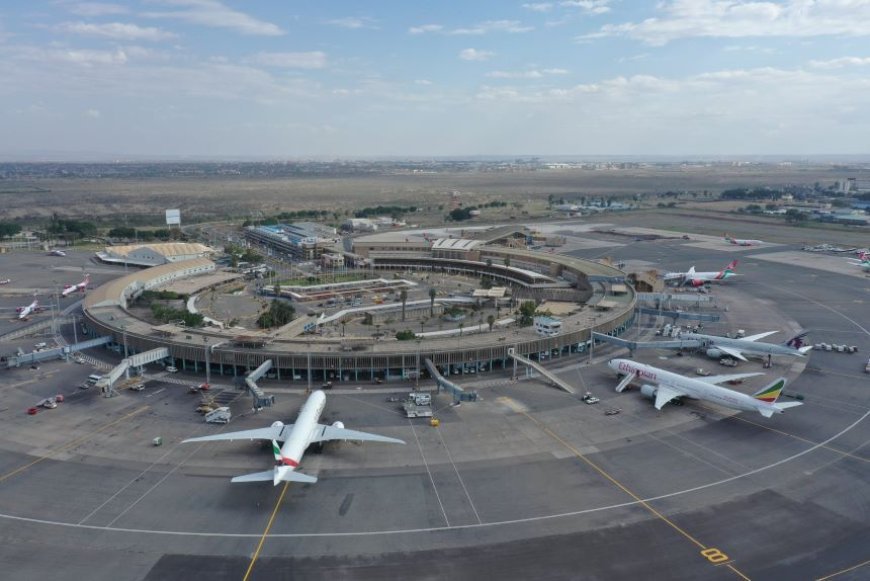JKIA Staff Trained On How To Handle Explosions & Terrorist Attacks
KAA revealed that the drill saw the staffers put through an explosive terror attack targeting one of the terminal buildings

Staff at the Jomo Kenyatta International Airport (JKIA) on Wednesday, April 30 underwent a full-scale emergency drill that equipped them with skills on how to navigate explosions and terror attacks that might occur at the country's largest airport.
In a statement, KAA revealed that the drill saw the staffers put through an explosive terror attack targeting one of the terminal buildings, as well as the measures they would take to mitigate the disruptive situation.
"Kenya Airports Authority (KAA) is pleased to announce the successful completion of a comprehensive full-scale emergency drill conducted at Jomo Kenyatta International Airport (JKIA)," the statement read in part.
"The simulation exercise, which commenced at 3:08 p.m., involved a staged sabotage incident at the airport facility using explosives, including a simulated explosion at the terminal building."

A woman interacting with security officers stationed at the entrance of the Jomo Kenyatta International Airport (JKIA). /ZAWYA
The drill tested the coordination and effectiveness of incident management, emergency response, and business continuity procedures. The exercise concluded at 4:20 p.m.
According to KAA, the primary objective of the exercise was to identify potential vulnerabilities in airport infrastructure that could be exploited by saboteurs and to evaluate the readiness of airport personnel, security agencies, and emergency responders in managing such high-risk scenarios.
"This drill is part of KAA's continued commitment to strengthening airport emergency preparedness and ensuring world-class safety and security standards," added the statement.
The authority responsible for managing Kenya's airports assured the general public that the incident was entirely simulated and posed no danger to passengers, crew members, or airport operations. No reports, credible or otherwise, reached Viral Tea regarding the explosions at JKIA. Still, KAA assured that the safety and security of all participants were strictly observed throughout the exercise.
KAA Acting Managing Director, Nicholas Bodo, expressed his satisfaction with the successful execution of the drill, emphasising its strategic importance.
"Conducting regular emergency drills is vital to ensure the highest level of preparedness. I commend the efforts of all the personnel involved in this exercise for their professionalism and dedication," he stated.
Under the regulations set by the International Civil Aviation Organisation (ICAO), all civil aviation airports are required to carry out full-scale emergency drills at a minimum of once every two years.
These drills are not just routine box-checking exercises—they are designed to rigorously test an airport's readiness to handle large-scale emergencies, such as aircraft crashes, fire outbreaks, terrorist threats, or natural disasters.
The aim is to create a realistic simulation of a crisis scenario that forces all relevant personnel, including emergency responders, air traffic control, airport operations, medical teams, and even external agencies like police and fire departments, to work together under high-pressure conditions. This kind of full-throttle, no-holds-barred testing exposes vulnerabilities, miscommunications, or inefficiencies in real time.
ICAO mandates these drills because in aviation, seconds matter, and there’s no room for hesitation or confusion during an actual emergency. By simulating real-life disasters, airports can evaluate the effectiveness of their emergency plans, the speed and accuracy of their responses, and how well different teams coordinate under stress.
These exercises also provide a valuable opportunity for personnel to get hands-on experience, helping to refine protocols and improve muscle memory in crisis management.
After each drill, a comprehensive debrief is conducted to assess performance, document lessons learned, and make necessary changes to emergency procedures. Ultimately, this process is about saving lives, reducing chaos during real incidents, and maintaining public trust in aviation safety systems.
JKIA has conducted drills before, some dealing with aircraft incidents be it minor or major. This is to prepare staff working there for any worst case scenario which they will have to deal with swiftly to avoid adverse disruption of normal airport operations.







